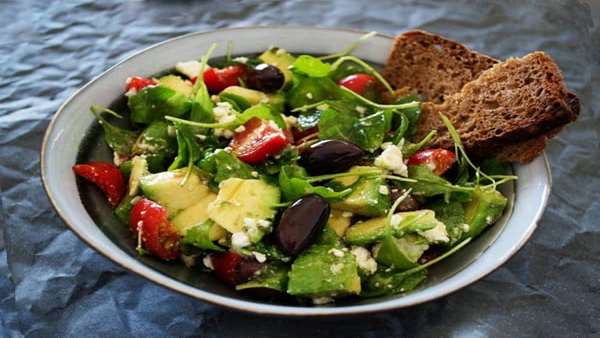People who love Greek food and other Mediterranean fare may be pleased to know that what you eat may extend and even save your life.
A new study from the Netherlands and the United Kingdom has found that a Mediterranean diet can improve immunotherapy response in people with advanced melanoma, the most serious type of skin cancer.
The research was presented today at a conference held by the European Society of Gastrointestinal Endoscopy. The findings have not been published yet in a peer-reviewed journal.
In their study, researchers report that a Mediterranean diet rich in fiber, mono-unsaturated fatty acids, and polyphenols has been associated with improved immunotherapy response rates and progression-free survival in people with advanced melanoma.
Dr. Laura Bolte, a dietician, PhD candidate, and the author of the study, told Healthline that aMediterranean diet containing mono-and polyunsaturated fats from olive oil, nuts, and fish as well as polyphenols and fiber from vegetables, fruit, and whole grains, was associated with a significantly improved response to immunotherapy drugs called immune checkpoint inhibitorsTrusted Source.
The inhibitors, which to date are among the most effective treatments for melanoma, work by blocking checkpoints in a person’s immune system, which then force the body’s T cells to attack cancers.
Researchers conducting the multi-center study recorded the dietary intake of 91 people with advanced melanoma who were treated with immune checkpoint inhibitor drugs and monitored their progress with regular radiographic response check-ups.
The people in the study were not put on a specific diet, but they filled out a detailed dietary questionnaire prior to treatment through which researchers assessed their dietary habits, explained Bolte.
As well as having a significant association with overall response rate, a Mediterranean diet was significantly associated with progression-free survival at 12 months, the researchers reported.
Immune checkpoint inhibitors have helped to revolutionize the treatment of different types of advanced cancers and Bolte noted that this latest study underlines the importance of dietary assessment in people with cancer starting these types of treatment.
The researchers also found that eating whole grains and legumes reduced the likelihood of developing drug-induced immune-related side effects such as colitis.
In contrast, red and processed meat was associated with a higher probability of immune-related side effects.
Experts expect that diet will play an important role in the success of immunotherapy and clinical trials are being expanded to investigate outcomes for different tumor types, including digestive cancers, Bolte said.
The relationship between immune checkpoint inhibitor response with diet and the gut microbiome opens a promising and exciting future to enhance treatment responses.
“Clinical trials investigating the effect of a high fiber diet, ketogenic diet, and supplementation of omega-3 are underway,” said Bolte.
She added that since immune checkpoint inhibitor therapy is being expanded to various tumor types, including digestive cancers, these studies could unlock treatment benefits for a large group of cancer patients in the future.
Sonya Orme, a business owner and life coach in San Diego who was born and raised in Istanbul, Turkey, told Healthline that she is not surprised by the findings of this study.
When she returns to Turkey to see her family, Orme said she feels demonstrably better. When she returns to the United States, she notices inflammation in her gut returning to some degree and she thinks it’s because of the food.
Orme says that eating olives, olive oil, fish, nuts, vegetables, and fruit is healthy, as is adding lemon to the daily diet.
“When I go back to Turkey, as soon as I start eating it makes a difference. I have realized that this kind of food is really good for inflammation, when I get back to the U.S., my body again feels more inflamed,” she said.
When you eat fresh Mediterranean food you really can feel the difference, Orme said.
“We don’t use the dressings that are sold in the store in the U.S., for example, they are not as healthy, and I also think the amount of vegetables that are consumed every day in Mediterranean homes make a difference. We don’t store food in cans. No processed food,” she said.
Historically, nutrition has been somewhat neglected in prospective studies within oncology.
“However, this is changing and a number of studies examining nutrition as anti-cancer therapy are underway worldwide,” said Bolte.
She added that immune checkpoint inhibitors have improved the prognosis across several tumor types at the advanced stage.
However, not all people with cancer respond to this treatment.
“Some patients develop drug-induced immune-related side effects such as colitis, which is inflammation of the gut,” she said.
“So the question is: How can we increase the response to immune checkpoint inhibitors to make more patients benefit? The relationship of immune checkpoint inhibitors with diet and the gut microbiome opens a promising and exciting opportunity to do so,” Bolte said.




ارسال به دوستان